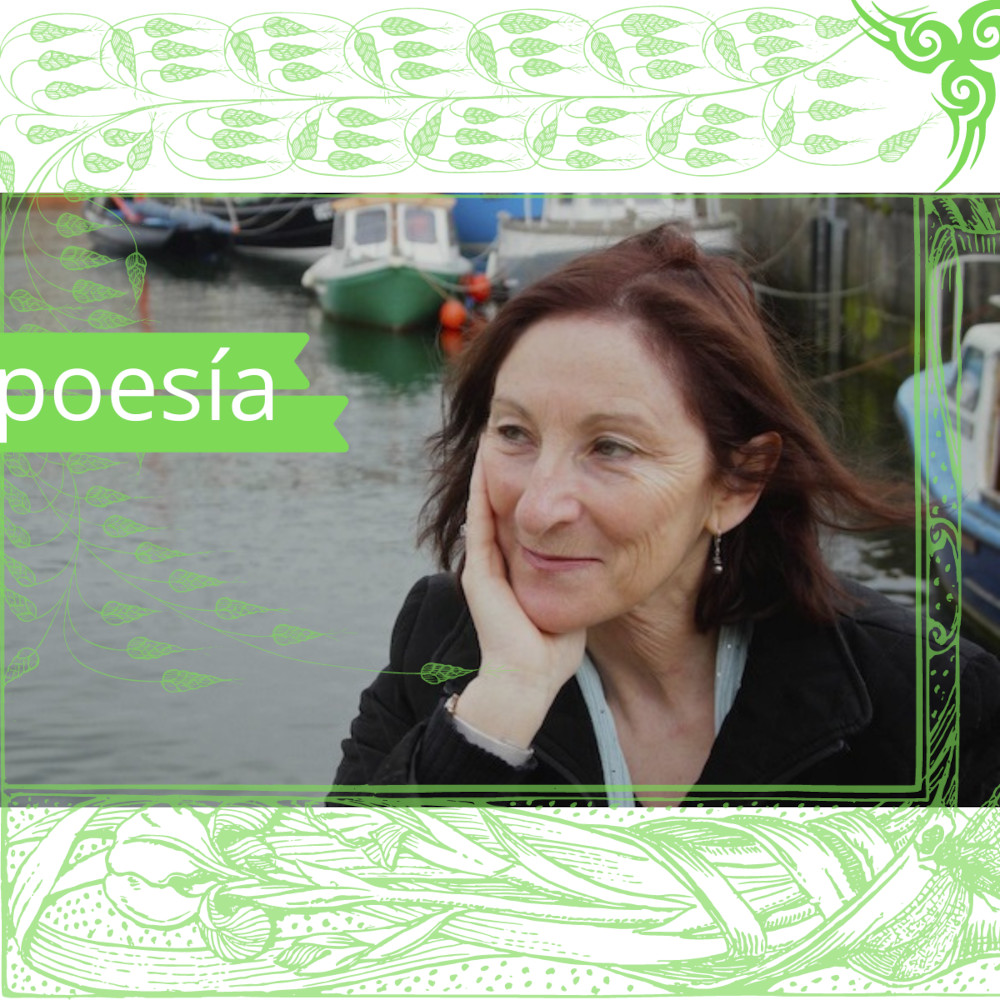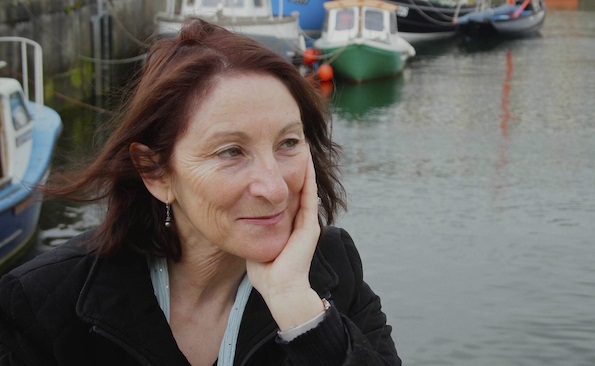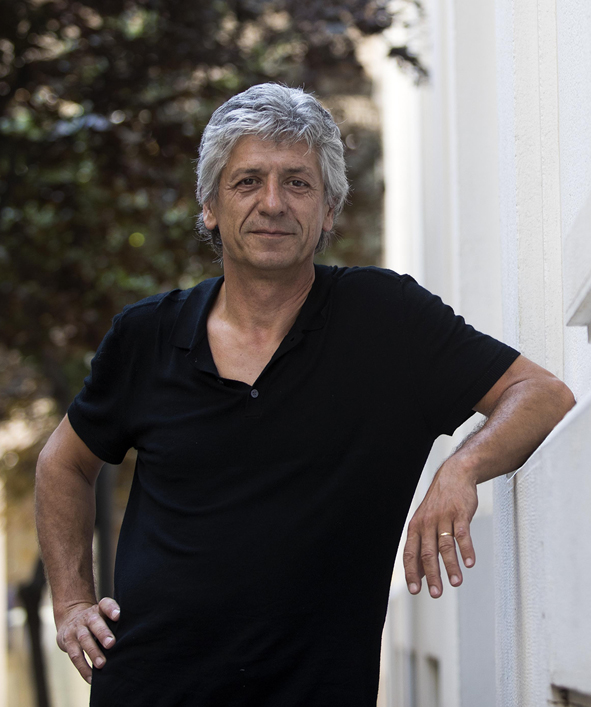Revistas >
OJOXOJO >
vol. 03 >
Poesía >
Mary O’Malley | Destellos de acero en el sol

La cueva
¿Qué sombras entrarán esta noche en mi cueva oscura?
¿A quién postrará o fortalecerá la luna?
¿Qué formas? ¿La algarabía y volteretas
de una batalla de Hollywood?
¿Un alma sin absolución, enteca y blanca?
Quizá las vírgenes del mar naden ahora
junto a los antepasados grises de los Mac Conghaile,
las focas. El ir y venir de las mujeres con chal
dispuestas a quedarse es cierto.
Ciertas las oscuras horas que descienden en silencio
del precario techo de los sueños,
frenéticas en la telaraña de la desasosegada potestad del sueño.
Los estridentes o susurrantes fantasmas,
los muertos ancestrales, entran cada noche,
reclaman ser escuchados. Trillan los estrechos
de las amplias y esbeltas vocales, se ahogan con las palabras.
Mi boca torturada como un poema
forzado entre la chispa y la forma.
"Caol le caolagusleathan le leathan"[1], se burla de mí.
Escucho el dulce embrujo de las focas
e indago su procedencia. Sobresalta el oído.
¿Son las voces atrapadas de los ahogados
o el extraño grito de criaturas mudas
que anhelan algo más, ser humanas?
Como nosotros. Siempre condenados.
No consigo poner en palabras
el canto de lo inalcanzable, y tarareo.
Siempre he vivido en una cueva marina
en la que aguarda un hombre oscuro, indolente.
Su cara, medio escondida, medio visible
es como la luna incipiente, impasible
y, como la luna, observa el desvelo de la noche.
Inútil concebir un rescate, aunque
lo esperamos. Luz. Una llama
se eleva lentamente como una lámpara de aceite,
ojos prendidos por una oleada de perdido resplandor.
A la luz las mujeres con chal se marchitan,
su incesante vigía requiere un velo.
El hombre oscuro, iluminado queda al descubierto.
Una vez bastará. Un profundo beso
de luz para eclipsar la última charca de oscuridad
en Europa y todo volverá a la tiniebla,
reposado, seguro de que mañana
será esplendoroso. La espera es antigua;
ningún dios ha resucitado aún en este frío mar.
Sin embargo, las noches en que el cielo hurta
las últimas gotas de luz del agua
y las olas, inocentes y enmarañadas en algas,
succionan y murmuran en la cueva, recuerda
que no lejos de aquí un hombre quebrantó su fe;
necesitado de lastre para el bote
tomó las piedras de la capilla de una isla sagrada.
Más tarde, atormentado, al lanzarlas por la borda
miró hacia atrás y vio que las piedras robadas flotaban.
The Cave
What shades will enter my dark cave tonight?
Who will the moon render powerless or strong?
What shapes? The fuss and tumble
of a Hollywood battle scene?
An unshriven soul, thin and white?
Sea virgins might even now be swimming in
with those grey ancestors of the Mac Conghaile,
the seals. The toss and tangle of shawled women
settling in for the long haul is certain.
Certain the dark hours falling silently
off all the precarious roofs of dreams,
frantic in the web of dream's unquiet authority.
Those shrill or whispering ghosts
the ancestral dead, enter nightly
claiming to be heard. They thresh the straits
of broad and slender vowels, choking on words.
My mouth is wracked like a poem
stretched between spark and shape.
‘Caol le caol agus leathan le leathan’ mocks me.
I listen to the seals' sweet haunt
and trace its provenance. It shocks the ear.
Are these trapped voices of the drowned
or is it the strange cry of dumb creatures
longing for something more, to be human?
Like ourselves. Always we are doomed.
I cannot put English on this,
the song of unattainable things, so I hum.
I have always lived by a sea cave
where a dark man waits, incurious.
His face, half-hidden, half-seen
is like the incipient moon, unmoved
and like the moon he watches the night unfold.
Useless to expect rescue but nonetheless
we expect it. Light. A flame
slowly turned up like an oil lamp,
eyes kindled by a swell of lost radiance.
In light the shawled women shrivel,
their incessant watching requires a veil.
The dark man, illumined is unmasked.
Once would be enough. One deep kiss
of light to eclipse the last pool of darkness
in Europe and all sink back into shadow
rested, confirmed that tomorrow
will be glorious. The wait is ancient;
no God has risen from this cold sea yet.
Yet, on nights when the sky plunders
the last drops of light from the water
and waves, innocent with tangled seaweed
suck and mutter in the cave, remember
that not far from here a man broke faith;
in need of ballast for his boat
he took the chapel stones from a sacred island.
Later, heaving them overboard uneasily
he looked back and saw the stolen rocks float.
Espacio Tiempo Curva
Entonces era mi cuchillo.
Destellos de acero
en el sol.
Cortó una naranja en cuatro trozos
y me ofreció uno,
la hoja empapada en dulce zumo.
Así era en el sol,
fresas para comer y un baño
en la vida misma. La vida sabe
a sal y fresas
a lamer la hoja de acero,
después, una espina en el pie.
Cuando el tiempo vira y se encrespa
hacia atrás y estamos suspendidos
en lo alto de una ola desplegada
la joven, la fruta y el hombre
con el cuchillo en la mano.
Space Time Curve
He was my knife then.
There were flashes
of steel in the sun.
He cut an orange into quarters
and handed me one,
the blade sweet with juice.
That’s how it was in the sun,
strawberries for lunch and a swim
into life itself. Life tastes
of salt and strawberries
and the flat lick of steel
then the sting of a thorn in your heel
When time swerves and curls
backwards and we’re poised
at the top of a wave all unfurled
the girl, the fruit and the man
with the knife in his hand.
Quizás
Uno se cansa de ser salvaje
cuando la cresta de una ola rota por el viento
es algo habitual. El peregrino
en la roca quiere volver
a su vida normal antes de ser salvaje,
ave rapaz o correr peligro de extinción.
Quizá le gustaba ser halcón
sin adjetivo alguno.
Quieres salir en un bote y pescar
sin que los guardacostas te aborden
como si fueran la Marina de los EE.UU.
y escondieras un alijo
de inmigrantes para el mercado negro.
Quieres estar al sol, en la playa
viendo los cambios purpúreos en una poza
con marea baja y no sentir vergüenza
por conocer cada centímetro de la costa,
aunque no el nombre específico de cada cosa,
ni sus implicaciones científicas.
Uno también se cansa
de que todo sea maravilloso.
Maybe
You get tired of being wild
when the crest torn from a wave in wind
is an everday thing. The peregrine
on his rock wants to go back
to normal life before he was wild
or endangered or a raptor.
Maybe he liked being a hawk
without any adjectives.
You want to go out in your boat and fish
without bailiffs arriving to board
as if they were the U.S. Navy
and you were hiding a catch
of immigrants for the black market.
You want to be on the strand in the sun
watching the purplish shifts in a pool
at lowtide and not feel ashamed
to know every inch of shore
but not the proper names for things,
nor the scientific implications.
You too get tired
of everything being marvellous.
Tierra de ángeles
Los niños nunca supimos
de aquellos lugares. La inquebrantable
reserva de las mujeres nos protegía
de lo que pudiera aterrorizarnos.
Oíamos los pavorosos susurros
y poblábamos de espectros aquellas moradas.
Pero nunca los vimos. Enterraban
a los inocentes sin bautizar al borde del mar
y en cementerios sin consagrar
junto a muros divisorios. Se abandonaba
a los niños medio humanos-medio almas
para que siguieran solos su camino por la
orilla nocturna.
Los funerales estaban prohibidos,
¿dónde lloraban las madres
en las diminutas casas irlandesas
tan queridas en aquellos tiempos?
Nunca delante de los niños.
¿Dónde entonces? ¿En el pajar, en el establo,
en las sombrías capillas de la iglesia?
Esa rígida religión cristiana
mortificaba la carne
y dejaba a las madres hueras,
con los pechos doloridos, siempre temerosas
de lo que trajeran las tormentas invernales
y de los sueños que las acometían como perros.
Cealtrach
The children were never told
about those places. The unbreachable
silence of women protected us
from terrible things.
We heard the dread whisperings
and peopled the swarming spaces with ghosts.
Yet we never knew. They buried
unnamed innocents by the sea’s edge
and in the unchurched graveyards
that straddled boundary walls. Those infants
half-human, half-soul were left
to make their own way on the night shore.
Forbidden funerals, where did mothers
do their crying in the two-roomed cottages
so beloved of those Irish times?
Never in front of the living children.
Where then? In the haggard, the cowshed,
shadowed alcoves of their church?
That Christian religion was hard.
It mortified the flesh
and left mothers lying empty,
their full breasts aching, forever afraid
of what the winter storms might yield,
their own dreams turning on them like dogs.
Descenso
Te he buscado entre los griegos
en los que el odio y el amor son cercanos como la sangre,
y la sangre se valora, y nada más .
Descendí entre los griegos a regañadientes
sin confiar en el expolio fariseo, pero ya
no hay tiempo. Se ha tirado de los hilos
el tiempo se ha tejido, anudado, cortado. Fui
a las ciudades y las islas lejanas
y encontré estatuas, mujeres con ojos ciegos
y despiadadas. En templos, en bares y casas,
en todas partes vi tu semejanza, y en todas partes
mujeres con mirada cansada
fija en la lejanía, en una isla azul
con delfines y un olivo, el peligroso toro
en su laberinto, y la mujer que sujeta el hilo.
Ninguna me habló, solo era otra
madre desesperada buscando a su hija.
Allí están acostumbradas.
Descent
I have looked for you among the Greeks
where hate and love are close as blood
and blood is worth so much and no more
I went down among the Greeks reluctantly
not trusting in cheap plunder but there is
no more time. Threads have been pulled
time woven, knotted, snipped. I went
to the cities and the far islands
and met statues, women with blind eyes
and no mercy. In temples and bars and houses
everywhere I saw your likeness, and everywhere
women with their bored gaze
fixed beyond me, on some blue island
with dolphins, an olive tree, the dangerous bull
in his maze, and the woman who holds the thread.
None of them spoke to me, just one more
crazed mother searching for her daughter
they are used to that here.
Vigilia
He pagado la moneda que el tiempo me ha extraído
en mi boca hay otra para el sudario
un pago voluntario para cuando te encuentren.
Permaneceré en la corriente helicoidal y los vientos
me abrasarán los tobillos, hasta que alguien mire
y diga “trato hecho”, entonces me hundiré
para reunirme con ella y llevarle las
semillas rojas del sol que le recuerden su hogar.
Permaneceré allí hasta que quiebre la oscuridad.
Vigil
I have paid the coin time has extracted
with another in my mouth for the shroud
a willing deposit for when you are found.
I will stand in the helical stream with the winds
scorching my ankles until someone looks up
and says ‘Bargain’ and then I will go down
to meet her and bring the small red
seeds of the sun to remind her of home.
I will stand there until the dark breaks open.
Sin título 2
Soy Grace, reina de hombres,
querida de mil navíos,
señora de Bunowen.
Madre trabajadora,
conservo mi apellido de soltera.
Untitled 2
I am Gráinne, Queen of men,
mistress of a thousand ships,
bunowen's chatelaine.
A working mother,
I keep my maiden name.
La petición
A las nueve en el hotel.
Si no vienes o llegas tarde
nos veremos en la tumba.
Creo que deberías ponerte
un vestido.
¿Te parece bien? Por supuesto,
ninguna mujer de Connemara que se precie
aparecería en un cementerio
con menos.
The Assignation
‘I'll meet you at the hotel at nine.
Failing that, or if you're late
we'll meet at the grave.
I've thinking of what you should wear.
A dress,
does that sound alright? ‘O definitely.
No self-respecting Connemara woman
would appear in a cementery
in less.’
*Traducción del inglés de Enrique Alda
NOTA
[1] “Las finas con las finas, las anchas con las anchas”.
Mary O'Malley
[Connemara, 1954] Estudió en la University College de Galway. Vivió durante ocho años en Portugal donde se desempeñó como profesora en la Universidade Nova de Lisboa. A su regreso a Irlanda, en 1990, empezó una fructífera obra poética que abarca siete títulos: A Consideration of Silk (1990), Where the Rocks Float (1993), The Knife in the Wave (1997), Asylum Road (2001), The Boning Hall (2002), A Perfect V (2006), Valparaiso (2012), Playing the Octopus (2016), por el que recibió el Michael Hartnett Poetry Award, y Gaudent Angeli (2019). Ha sido galardonada con el Hennessy Award en 1990, el premio Lawrence O'Shaughnessy en su 13ra edición, así como la Mención de Honor de la National University of Ireland, en Galway, en 2021.

Enrique Alda
Licenciado en Traducción e Interpretación por la Universidad de Salamanca, comenzó sus estudios de traducción en el Polytechnic of Central London, la Thames Valley University de Londres, Reino Unido y la California State University de Los Angeles, EE.UU. Ha disfrutado de becas en la Magyar Fordítóház Alapítvány en Balatonfüred, Hungría; The Tyrone Guthrie Centre en Newbliss, Irlanda; el College International des Traducteurs Litteraires en Arles, Francia; el British Centre for Literary Translation de la University of East Anglia en Norwich, Reino Unido y la Casa del Traductor de Tarazona, de la que fue coordinador y asesor técnico durante un año.

